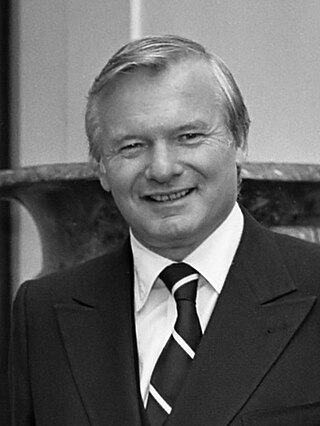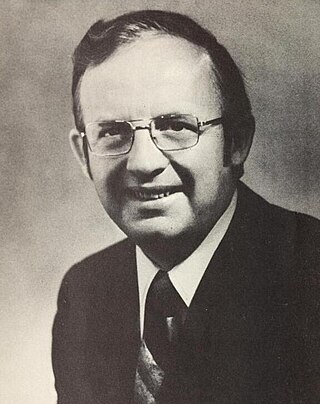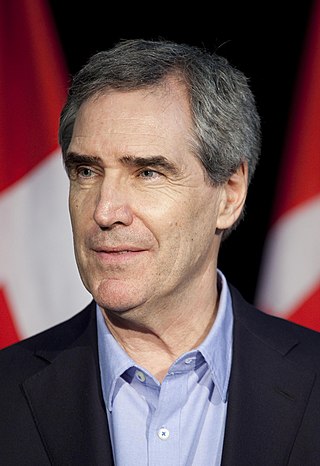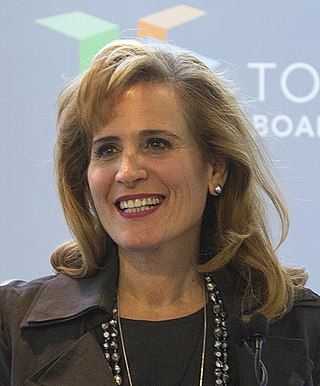Related Research Articles

William Grenville Davis, was a Canadian politician who served as the 18th premier of Ontario from 1971 to 1985. Behind Oliver Mowat, Davis was the second-longest serving premier of Ontario.
Lawrence Sheldon "Larry" Grossman, was a politician in Ontario, Canada. He served in the Legislative Assembly as a Progressive Conservative from 1975 to 1987, and was a cabinet minister in the governments of Bill Davis and Frank Miller. Grossman was leader of the Ontario Progressive Conservatives from 1985 to 1987.
On January 23, 2004, the Progressive Conservative Party of Ontario leader Ernie Eves announced his intention to step down as leader before the fall of 2004. Eves was elected party leader in the party's 2002 leadership election, and became Premier of Ontario. He led the party to defeat in the 2003 provincial election.
The Liberal Party of Canada held a leadership election on April 6, 1968. The election was won by Minister of Justice and Attorney General Pierre Elliott Trudeau, who became the new prime minister of Canada as a result. He was the unexpected winner in what was one of the most important leadership conventions in party history. The Globe and Mail's newspaper report the next day called it "the most chaotic, confusing, and emotionally draining convention in Canadian political history."
In 1985, the Ontario Progressive Conservative Party held two leadership elections: one in January, and one in November.
Dennis Roy Timbrell is a politician in Ontario, Canada. He was a member of Provincial Parliament (MPP) from 1971 to 1987, and was a Cabinet minister in the Progressive Conservative governments of Bill Davis and Frank Miller.

William Darcy McKeough was a Canadian politician in Ontario. He was a Progressive Conservative member of the Legislative Assembly of Ontario from 1963 to 1978 who represented the ridings of Kent West and Chatham—Kent. He was a cabinet minister in the governments of John Robarts and Bill Davis. Due to McKeough's senior position in cabinet as Treasurer, Minister of Economics and Intergovernmental Affairs and Minister of Municipal Affairs, he was often referred to as the 'Duke of Kent'.

Allan Frederick Lawrence, was a Canadian politician and served as both a provincial and federal cabinet minister.

Robert Stanley Kemp Welch was a Canadian politician. He served in the Legislative Assembly of Ontario from 1963 to 1985 as a member of the Progressive Conservative Party, and was a cabinet minister in the governments of John Robarts, Bill Davis and Frank Miller.
Albert Benjamin Rutter "Bert" Lawrence MC was a politician in Ontario, Canada. He was a Progressive Conservative member of the Legislative Assembly of Ontario from 1963 to 1974 who represented the ridings of Russell and Carleton East. He served as a cabinet minister in the governments of John Robarts and Bill Davis.

The 1983 Progressive Conservative leadership election was held on June 11, 1983, in Ottawa, Ontario to elect a leader of the Progressive Conservative Party of Canada. At the convention, Montreal businessman and lawyer Brian Mulroney was elected leader on the fourth ballot, defeating former prime minister and party leader Joe Clark.
The 1967 Progressive Conservative leadership election was held to choose a leader for the Progressive Conservative Party of Canada. The convention was held at Maple Leaf Gardens in Toronto, Ontario, Canada between September 4 and 9, 1967. Robert Stanfield was elected the new leader.
George Albert Kerr was a politician in Ontario, Canada. He served in the Legislative Assembly of Ontario from 1963 to 1985, and was a cabinet minister in the governments of John Robarts and Bill Davis. Kerr was a member of the Progressive Conservative Party and was the first person to hold the portfolio of environment minister in any provincial or federal cabinet in Canada.

Thomas Leonard "Tom" Wells was a politician in Ontario, Canada. He served in the Legislative Assembly of Ontario as a member of the Progressive Conservative Party from 1963 to 1985 and was a cabinet minister in the governments of John Robarts and William Davis. There is also a school in Scarborough, Ontario named after him.

In 2006, the Liberal Party of Canada held a leadership election to choose a successor to outgoing leader Paul Martin. Martin had announced that he would not lead the Liberals into another election, following his party's defeat in the 2006 federal election in Canada. The party's biennial convention, already scheduled to occur from November 29 to December 1, 2006, in Montreal's Palais des congrès, was followed by the party's leadership convention at the same venue occurring December 2 to December 3, 2006.
The 1996 Ontario Liberal Party leadership convention, held between November 29 and December 1, 1996 at the Maple Leaf Gardens in Toronto, elected Dalton McGuinty as the new leader of the Ontario Liberal Party, replacing Lyn McLeod, who announced her resignation following the 1995 Ontario provincial election.
The 2009 Ontario New Democratic Party leadership election was held in Hamilton, from March 6 to 8, 2009 to elect a successor to Howard Hampton as leader of the Ontario New Democratic Party (NDP). On June 15, 2008, Hampton informed the party's provincial council that he would not stand for re-election as leader at the next party convention in a year's time. While a leadership vote was held at each biennial convention of the Ontario NDP until and including the last regular convention in 2007, there is normally not a contested vote unless there is a vacancy, therefore, the 2009 vote was the party's first leadership convention since Hampton was elected in 1996 to succeed Bob Rae.

In 2009, the Liberal Party of Canada held a leadership election to choose a successor to Stéphane Dion. The election was prompted by Dion's announcement that he would not lead the party into another election, following his party's defeat in the 2008 federal election in Canada. The Liberals, who captured just slightly over 26% of the total votes, scored their lowest percentage in the party's history to that date.

The 2013 Ontario Liberal Party leadership election, held on January 26, 2013, at Maple Leaf Gardens in Toronto, elected Kathleen Wynne as the new leader of the Ontario Liberal Party, replacing Dalton McGuinty, who announced his resignation on October 15, 2012. With the Liberals forming the Ontario government, Wynne consequently became Premier of Ontario. After leading a minority government for 18 months, she called an election after the defeat of her government's budget and she led her party to a renewed majority government in June 2014.
The Ontario Liberal Party held a leadership election in 1976 on January 24–25 to replace Robert Nixon. Nixon had announced his retirement after the 1975 election in which the Liberal Party was reduced from Official Opposition status in the Legislative Assembly of Ontario to being the third party. Stuart Smith was elected as the party's new leader.
References
- ↑ "McKeough eliminated after third ballot, endorses Davis". February 13, 1971.
- ↑ "Party acting as if Robarts had resigned: Tories ask to reserve leadership convention site". The Globe and Mail. December 2, 1970. p. 1.
- 1 2 3 Peter Oliver (1975). John Saywell (ed.). Canadian Annual Review of Politics and Public Affairs (1971). Toronto: University of Toronto Press. pp. 99–102.
- ↑ "Student to run for leadership". The Globe and Mail. February 1, 1971. p. 8.
- 1 2 Manthorpe, Jonathan (1974). The Power & the Tories . Toronto: Macmillan of Canada. pp. 115–116.